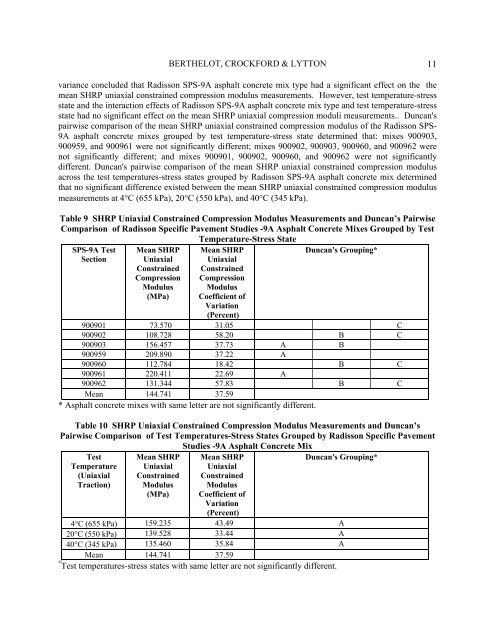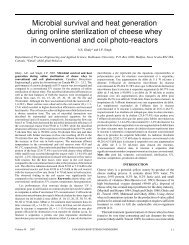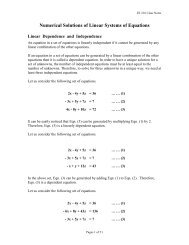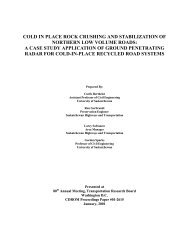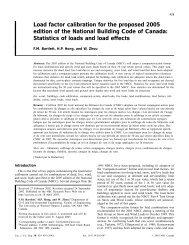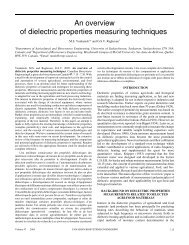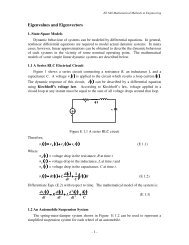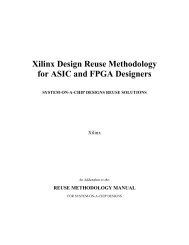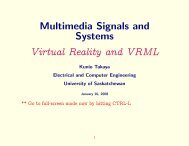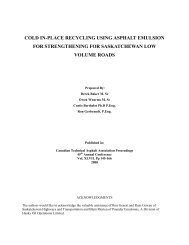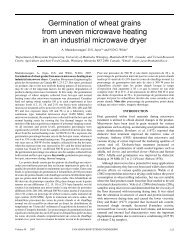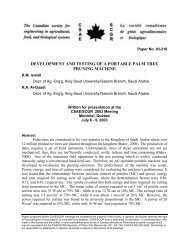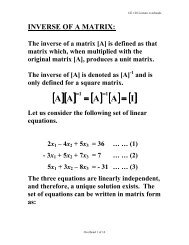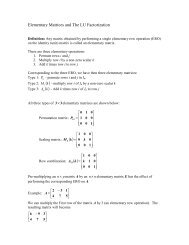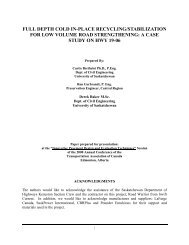comparison of alternative asphalt concrete rut characterization
comparison of alternative asphalt concrete rut characterization
comparison of alternative asphalt concrete rut characterization
Create successful ePaper yourself
Turn your PDF publications into a flip-book with our unique Google optimized e-Paper software.
BERTHELOT, CROCKFORD & LYTTON 11variance concluded that Radisson SPS-9A <strong>asphalt</strong> <strong>concrete</strong> mix type had a significant effect on the themean SHRP uniaxial constrained compression modulus measurements. However, test temperature-stressstate and the interaction effects <strong>of</strong> Radisson SPS-9A <strong>asphalt</strong> <strong>concrete</strong> mix type and test temperature-stressstate had no significant effect on the mean SHRP uniaxial compression moduli measurements.. Duncan'spairwise <strong>comparison</strong> <strong>of</strong> the mean SHRP uniaxial constrained compression modulus <strong>of</strong> the Radisson SPS-9A <strong>asphalt</strong> <strong>concrete</strong> mixes grouped by test temperature-stress state determined that: mixes 900903,900959, and 900961 were not significantly different; mixes 900902, 900903, 900960, and 900962 werenot significantly different; and mixes 900901, 900902, 900960, and 900962 were not significantlydifferent. Duncan's pairwise <strong>comparison</strong> <strong>of</strong> the mean SHRP uniaxial constrained compression modulusacross the test temperatures-stress states grouped by Radisson SPS-9A <strong>asphalt</strong> <strong>concrete</strong> mix determinedthat no significant difference existed between the mean SHRP uniaxial constrained compression modulusmeasurements at 4°C (655 kPa), 20°C (550 kPa), and 40°C (345 kPa).Table 9 SHRP Uniaxial Constrained Compression Modulus Measurements and Duncan’s PairwiseComparison <strong>of</strong> Radisson Specific Pavement Studies -9A Asphalt Concrete Mixes Grouped by TestTemperature-Stress StateSPS-9A TestSectionMean SHRPUniaxialConstrainedCompressionModulus(MPa)Mean SHRPUniaxialConstrainedCompressionModulusCoefficient <strong>of</strong>Variation(Percent)Duncan's Grouping*900901 73.570 31.05 C900902 108.728 58.20 B C900903 156.457 37.73 A B900959 209.890 37.22 A900960 112.784 18.42 B C900961 220.411 22.69 A900962 131.344 57.83 B CMean 144.741 37.59* Asphalt <strong>concrete</strong> mixes with same letter are not significantly different.Table 10 SHRP Uniaxial Constrained Compression Modulus Measurements and Duncan’sPairwise Comparison <strong>of</strong> Test Temperatures-Stress States Grouped by Radisson Specific PavementStudies -9A Asphalt Concrete MixTestTemperature(UniaxialTraction)Mean SHRPUniaxialConstrainedModulus(MPa)Mean SHRPUniaxialConstrainedModulusCoefficient <strong>of</strong>Variation(Percent)Duncan's Grouping*4°C (655 kPa) 159.235 43.49 A20°C (550 kPa) 139.528 33.44 A40°C (345 kPa) 135.460 35.84 AMean 144.741 37.59* Test temperatures-stress states with same letter are not significantly different.


